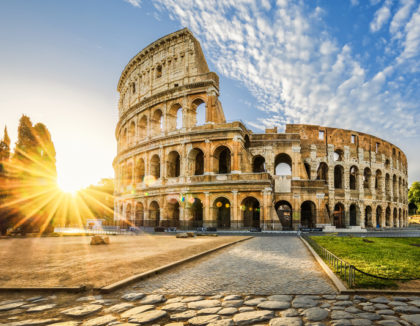National Information on Italy – Sicily
Comparison of temperatures
| Jan | Feb | Mar | Apr | May | Jun | Jul | Aug | Sep | Oct | Nov | Dec |
| Rome | 11 | 13 | 17 | 18 | 23 | 27 | 29 | 29 | 26 | 20 | 17 | 13 |
| London | 8 | 8 | 11 | 15 | 18 | 20 | 22 | 22 | 19 | 17 | 12 | 8 |
General note:
Below is an information overview. The conditions of entry, as well as the political and health situation, can change anywhere in the world at any time. We therefore recommend checking before your trip. Please check the website of the Foreign Office (www.gov.uk) before your departure.
Form of government:
Republic, parliamentary democracy with bicameral system. President Sergio Mattarella has been the head of state since February 2015. Minister President Giorgia Meloni has been the head of government since October 2022.
Capital:
Rome has been the capital of Italy since 1871 and has 2.8 million inhabitants.
Religion:
Primarily Roman Catholic
Language:
The national language is Italian. Friulian, Ladin, German, Slovenian, Occitan, French, Franco-Provencal, Albanian, Greek, Sardinian, Catalan and Croatian are also officially recognised minority languages.
Climate:
In Italy, the climate varies significantly between the north and south. The north is governed by a harsh climate with very cold winters and very hot summers with high levels of humidity. In the centre, the climate is moderate while winters are always mild and summers very warm and sultry in the south and on the islands.
Local time:
Italy is part of the Central European Time zone where GMT+1 applies, along with daylight saving time.
Making Phone calls:
To call an Italian phone number from abroad: international dialling code for Italy (+39), followed by the respective phone number. To make phone calls to the UK: pre-dial 0044 (+44).
Entry requirements for British citizens:
British nationals do not need a visa to enter Italy. Your passport should be valid for the proposed duration of your stay. Nationals of other countries are advised to inquire at the Italian Embassy about the entry requirements applicable to them. Customers are reminded that it is their sole responsibility to make sure that passport and visa entry requirements for the country or countries that they are visiting are satisfied. Regulations in respect of passport and visa requirements for Italy are the responsibility of the Ministry of Foreign Affairs and International Cooperation whose Web site is www.esteri.it/mae/en/. If you hold a different type of British nationality (BN(O), British Overseas Citize n, British Protected Person or British Subject), check visa requirements with the Italian Embassy before you travel. However, passport and visa requirements change from time to time and are also dependent on the purpose of your visit and your nationality. Whilst we endeavour to provide guidance where necessary, we can not be responsible for any problems encountered (whether at any point of entry or elsewhere) in the event that passport and visa requirements are not satisfied.
For up-to-date information on entry requirements, please visit www.gov.uk/foreign-travel-advice/. The EU has a new visa waiver system, called ETIAS, which will be valid for three years. British passport holders travelling to the EU will need to apply and pay for an ETIAS, via an online system (https://etias.com/).
Tour guide:
Your tour guides will be able to provide you with detailed information on the country, people, history, culture etc., and offer advice and assistance in organising your trip. They can also help with room allocation and look forward to welcoming you with initial information. Here you will find out all you need to know and useful information about the trip. We have put together a varied programme including numerous highlights, enabling you to experience the culture and diversity of landscape that Italy has to offer, and learn all about the country and its people.
Additional packages:
Although your trip already includes a comprehensive package, you also have the option of choosing added extras. We recommend booking the following packages:
Half board: The package includes 7 × evening meals (3-course menu with dishes typical of the region): only £169* per person.
Explorer package: The package includes 2 full-day excursions to “Caltagirone & Piazza Armerina (World Heritage)“, “Palermo & Monreale (2× World Heritage)“ and the “City tour of Taormina incl. admission to the Greek-Roman theatre“: only £229* per person.
* Package prices may vary when booking on site.
City tax:
A State city tax of 1,50 € (approx. £ 1.30) per person/night (last revised: August 2023), to be paid on site.
Currency:
The currency is the Euro. Exchange rate (as at January 2024): 1 GBP = 1.15 EUR; 1 EUR = 0.87 GBP.
Banks/Credit cards:
Purchases can be paid for in cash and using the most popular credit cards. This payment system is typical in Italian shops; the symbols of credit cards accepted are usually displayed at the entrance to shops. Passports are required when paying by credit card. Travellers’ cheques (in dollars or Euro) can also be cashed in banks. It is also possible to withdraw cash from ATMs using EC/Maestro cards but high fees may be charged by the respective bank. Cash payments exceeding 10,000 EUR (8660 GBP) are not possible in Italy. Sums exceeding 10,000 EUR can only be paid for by credit card, EC card or by bank transfer.
Customs regulations:
There are a number of products which have entry or exit limitations in Italy from outside the European Union. These include cultural goods, wild fauna and flora and products derived from these, vegetables and plant products, weapons and ammunition, medicines, tobacco and alcoholic beverages (please note the alcohol and cigarette allowances). You cannot take meat, milk or products containing them into EU countries. In terms of medications, only those necessary for personal use are allowed, and they must be accompanied by a copy of the prescription or medical report.
Important: If you are travelling to Great Britain from outside the UK, your personal allowances mean you can bring in a certain amount of goods without paying tax or duty. If you go over your allowances you must declare all your goods and pay tax and duty on all the goods in that category. Please inform yourself about the current customs regulations: www.gov.uk/bringing-goods-into-uk-personal-use/arriving-in-Great-Britain.
Safety instructions:
Italy lies in a seismically very active zone, which is why earthquakes are common.
Crime: Vigilance should be exercised regarding pickpockets and petty crime in tourist centres in particular, especially cases of fraud where tourists are distracted (e.g. by jostling etc.) and then stolen from by accomplices. As for any holiday trip, the rule is to only ever carry what is absolutely necessary. Large amounts of cash and original identification documents should always be deposited in the hotel safe. If necessary, only carry secure credit cards (protected by PIN) on your person. Take photocopies of your documents with you when you travel. Alternatively, you can save the files on a private e-mail account, enabling them to be accessed wherever you are in the world. When walking outside, do not wear bags or cameras on the side facing the street, making it more difficult for them to be stolen by thieves on motorbikes.
Medical information:
At least 8 weeks before your trip, check the latest countryspecific health advice from the National Travel Health Network and Centre (NaTHNaC – https://travelhealthpro.org.uk/countries) on the TravelHealthPro website. Each country-specific page has information on vaccine recommendations, any current health risks or outbreaks, and factsheets with information on staying healthy abroad.
Medical care:
Anyone entitled to free healthcare in the UK is also entitled to treatment in Italy – if it is urgently required – from doctors, dentists, hospitals, and so on that are approved by the foreign statutory health insurance company. You should get a free UK Global Health Insurance Card (GHIC) or European Health Insurance Card (EHIC) before leaving the UK. If you already have an EHIC it will still be valid as long as it remains in date. You can also contact your health insurance company for information on current regulations. Nonetheless, you are urgently recommended to take out travel health insurance for the duration of your holiday which covers risks not assumed by the statutory health insurance companies (e.g. repatriation to the UK in the event of illness, treatment by private doctors or in private hospitals). Such policies usually also offer benefits not covered by state health insurance companies, e.g. the costs of repatriation.
Customers must ensure that they are in good physical and mental health in line with the trip in question. Customers must enquire about the physical mobility and psychological autonomy required for this trip.
All information is subject to change/Last updated: January 2024
back Information & tips
 Travel highlights
Travel highlights
 Europe
Europe
 Asia
Asia
 America
America
 Africa
Africa
